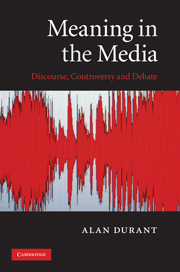Book contents
- Frontmatter
- Contents
- Acknowledgements
- Introduction
- Part I Communication failure and interpretive conflict
- 1 From personal disagreement to meaning troublespot
- 2 Signs of trouble
- 3 Different kinds of meaning question
- Part II Making sense of ‘meaning’
- Part III Verbal disputes and approaches to resolving them
- Part IV Analysing disputes in different fields of law and regulation
- Part V Conclusion
- References
- Index
1 - From personal disagreement to meaning troublespot
Published online by Cambridge University Press: 05 June 2012
- Frontmatter
- Contents
- Acknowledgements
- Introduction
- Part I Communication failure and interpretive conflict
- 1 From personal disagreement to meaning troublespot
- 2 Signs of trouble
- 3 Different kinds of meaning question
- Part II Making sense of ‘meaning’
- Part III Verbal disputes and approaches to resolving them
- Part IV Analysing disputes in different fields of law and regulation
- Part V Conclusion
- References
- Index
Summary
Introduction
Chapters 1–3 (Part I: ‘Communication failure and interpretive conflict’) look at how meaning disputes arise, what causes them, and how questions about meaning are formulated. In this first chapter, I suggest that controversies over media meaning, and complaint procedures in media law and regulation, involve different kinds of speech event from spontaneous disagreement in conversation. Processes for understanding and adjudicating such contestation of meaning, I claim, should reflect these differences of speech event structure and the roles in them of the various speech event participants.
Interpretive disagreement
As they leave the cinema one evening, Anita and Bobby fall into conversation about a film they have just seen, a film which portrayed life in an English country village. Bobby finds it difficult to agree with Anita's view that the film exploits people's sentimentality about animals and misrepresents what goes on in the countryside. His opinion is that the film, which he enjoyed, appeals to public sympathy towards animals rather than exploiting it. He can't really understand Anita's overall response either. Why does she think the film gives a distorted picture of how traditional villagers and urban newcomers interact? It seems to him that the film gives a basically accurate account of how things are. In any event, if the film expresses a viewpoint, perhaps it is treating its subject light-heartedly rather than cynically.
- Type
- Chapter
- Information
- Meaning in the MediaDiscourse, Controversy and Debate, pp. 19 - 32Publisher: Cambridge University PressPrint publication year: 2010



